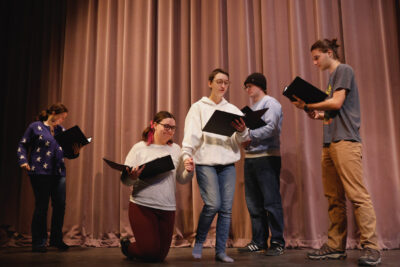Singing out amidst the worry and fear of the current political climate and pandemic can feel impossible, and, yet, that is exactly what H. Roz Woll would have the Voices of the Earth choir do.
Woll, assistant professor of music, began teaching at Goshen College this fall. She teaches classes such as Aural Skills, private voice lessons and vocal masterclass, as well as directing Voices of the Earth.Recently, Woll received her Doctorate of Musical Arts in vocal performance from the City University of New York’s (CUNY) Graduate Center.
During this process, Woll had to complete three vocal recitals as well as a 160-page dissertation over a concentration of her choosing.
While it was a long and challenging process, Woll thoroughly enjoyed taking classes that discussed social and gender construction. Classical social theory “helped [her] understand more of how the world was shaped … it made it seem like things were changeable.”
In addition to this, she learned valuable ideas that could be applied to her teaching.
Heidi Roz Woll, or “Roz” for short, first got her nickname during her travels in Haiti. What started out as a joke with friends became a name that really stuck.
While serving as the Director of Music at St. Paul & the Redeemer Episcopal Church in Chicago, Woll was given the opportunity to travel to Haiti in partnership with local organizations to build a school in a town about two hours from Port-au-Prince. This trip was made possible because of the head of church’s long-standing relationship with Cathédrale Sainte Trinité, a church in Port-au-Prince, Haiti.
The first night in Haiti, Woll had a conversation with a co-worker where the topic of names came up.
After Roz said that her middle name was Anne, her friend jokingly said, “I don’t think your name fits you. What do you think of Rosalind or Roz?”
After some laughter, Roz considered her new nickname.
Several months later, Woll began to use her nickname more frequently in communication. It became how she introduced herself during her time working on staff with the Chicago Children’s Choir’s annual choral camp.
“At the workplace, there was a culture of nicknames and I never actually felt like Heidi quite fit me … though it is a beautiful name,” she said. “So I was joking around with another person named Tom, and I said, ‘I’ll call you Tomas and you can call me Roz.’”
While nicknames can be silly, Woll felt that “Roz” perfectly fit her personality. So, after using H. Roz Woll at the workplace, Woll began to use her nickname in other professional settings while completing her master’s and doctoral work.
Before joining GC, Woll grew up in Chicago.
From a young age, music was a key part of her life as she sang in the Chicago Children’s Choir from third grade through her senior year of high school.
The Chicago Children’s Choir is a non-profit organization that unites youth from diverse racial and socioeconomic backgrounds through the power of music.
“I grew up thinking it was just really normal to learn songs in many different languages … both written and from oral traditions,” Woll said.
While participating in the Children’s Choir, Woll admired her directors’ focus on exploring Leonard Bernstein’s Chichester Psalms and music from the Renaissance, instead of “having kids sing ‘kids’ music.’”
Being a part of a choir wasn’t the only thing that influenced Woll’s background and musical repertoire.
Woll said that attending schools that were “particularly attuned to issues of race,” including choirs that programmed repertoire by classical Black composers, expanded her knowledge and appreciation of composers and music that normally went unrecognized. Roland Carter’s “Lift Every Voice and Sing,” known as the Black national anthem, was just one of the many pieces that Woll sang as a part of the choir.
With an extensive background in choral music as well as her doctorate in vocal performance and Africana studies, Woll has channeled her love for diversity and different cultures in the repertoire that she selects for choirs.
This year, for the Voices of the Earth choir, Woll chose pieces that highlight an assortment of languages and traditions to bring to light racial and social injustices by “foregrounding musical traditions that are not at the center of attention as much.”
“[In the fall,] I wanted to focus on having a constellation identity with regard to Blackness,” Woll said. “I would take that approach with any culture or ‘identity.’”
For this spring, Woll picked songs such as “Adinu,” “Alma Llanera,” and “Mnohaya Lita,” to highlight the variety of languages and stories of women all around the world. It shifts away from introspection and focuses on the various identities in the US.
“I think Roz is on the right track, picking music for the times that we are living in now,” said
Mary Schmauss, a junior social work major and member of Voices of the Earth.
“It’s valuable that she is making the effort to educate [students] about what is going on in the world,” Schmauss said. “It’s one thing to sing about it, but learning about it is equally important.”
Ainslee Zou, a junior biochemistry and music double major and a member of Voices of the Earth, agreed with Schmauss’s thought.
“In a way, Roz has taken Deb [Detwiler Brubaker’s] vision for the choir and made it applicable to our culture today because she wants to redefine the stigmas that are usually in music, and challenge the idea that music is just a white man’s activity,” Zou said. “It shouldn’t be limited to just this.”
“[Music] should contribute to a vast diversity of cultures other than just our own,” Zou said.
Woll brings all of these ideas together, saying: “When in doubt, sing out.”
In times of fear and tribulation, music serves a purpose. Amidst our current political climate and pandemic, it sings of hope and love.



